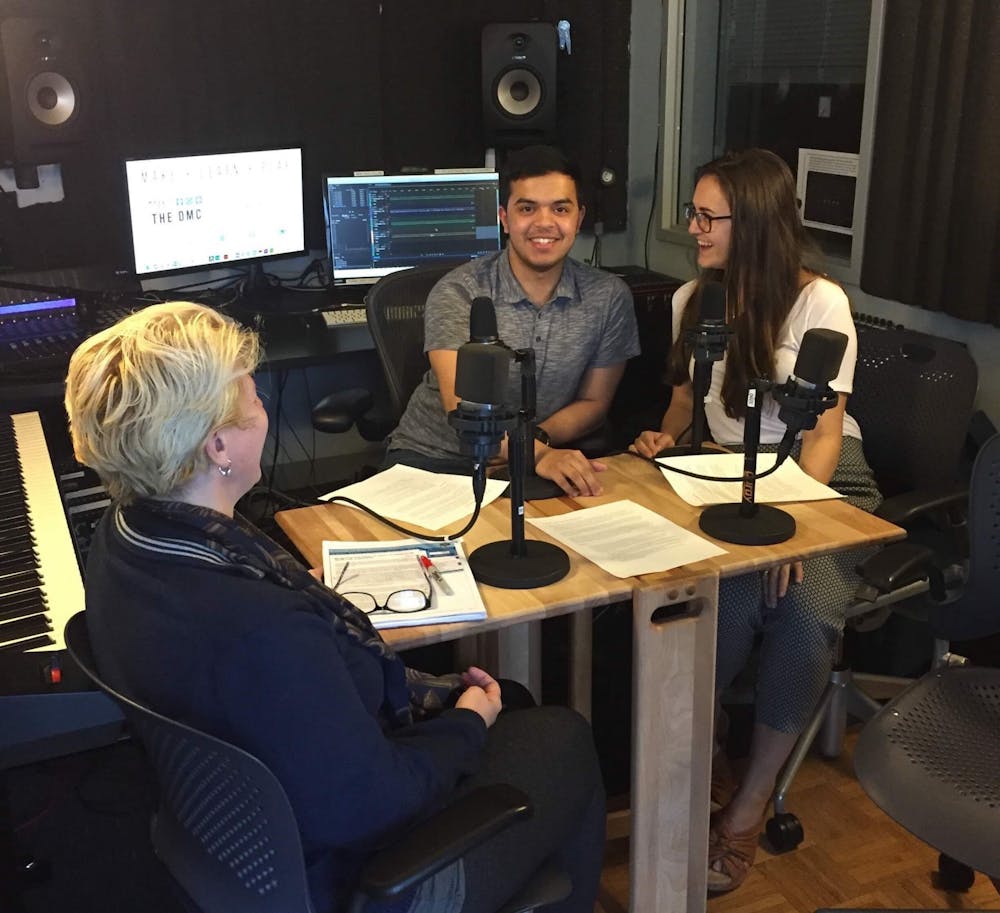When students Franz Osilia, Megan Rutkai and Zach Wheeler founded the Hopkins Podcast on Foreign Affairs (POFA) three years ago, they had no experience in podcasting. Today, POFA has released over 40 episodes, covering geopolitical trends and crises from every continent.
Osilla, Rutkai and Wheeler are currently students at the School of Advanced International Studies (SAIS), but founded POFA when they were freshmen at Homewood campus.
According to Wheeler — the team’s “Head Imagineer” — the podcast was originally created because he wanted to encourage conversations on campus about international events.
“[We] saw a gap between news related to international affairs and how much people were actually talking about it in their day-to-day lives, especially at Hopkins,” he said. “It definitely has to do with wanting to spark discussion, but another big thing is just all of us find it really fun.”
In each episode the POFA team discusses a current foreign affairs issue with a featured guest expert. Their topics range from broad international trends to more topical events.
Senior Tuna Çoluk, a POFA listener, told The News-Letter that one of the podcast’s main strengths is its accessibility.
“It’s always great to listen to podcasts, but this podcast specifically is good if you don’t know that much about global news,” she said. “This podcast will help you get into that stuff.”
Çoluk said that she also loves how POFA tries to keep its topics relevant.
“It’s always up to date... The moment something about North Korea happens, they find someone who’s an expert on North Korea,” she said. “There’s always a lot going on in the world. You can’t touch on everything, but they pick wisely and optimally and definitely take advantage of the connections that we have at SAIS.”
Although early episodes mainly featured University professors as guest speakers, the podcast has since expanded to include representatives from think tanks, political figures and more.
Osilia told The News-Letter that while University faculty are a great resource, guests do not need to be affiliated with Hopkins.
In July, POFA featured former Vice President of Taiwan and Hopkins alum Chen Chien-jen in an episode about Taiwan’s response to coronavirus.
“We saw that he was a Bloomberg alum and his term was ending. At the beginning of the summer, [POFA Chief Executive Officer] Julia An sent a cold email out,” Osilia said. “After he finished his vice presidency, he was kind enough to respond to us, which we were extremely grateful for. We are trying to keep raising the bar.”
POFA has also recently increased their output, releasing three new episodes every two weeks.
Osilia said that by incorporating more members and formalizing production, the podcast was able to get into a new and improved groove.
“Instead of three students just ad hoc-ly making podcasts, we said ‘Let's turn this into a student organization, let's get more people in, let’s assign roles so that we have a more organized and well-oiled operation,’” he said. “This summer has proven to us that we can really expand the reach beyond the Hopkins and SAIS bubble.”
While the current team of six students has had a productive summer, the podcast is not done growing. In the upcoming weeks, POFA will be opening applications for new members.
In an email to The News-Letter, sophomore and POFA listener Peter Huang explained that while he is very impressed with the podcast’s recent work and growth, he hopes to see even more variety in the future.
“I would like to see the podcast seek to invite speakers that demonstrate another perspective,” he wrote. “For example, when it comes to political events involving China, it would be great if the podcast could invite relevant academic speakers from both China and the United States for an informative discussion. This would definitely provide the audience with a more holistic session on a certain issue.”
According to Osilia, the podcast is continuously improving.
“The very first thing [Wheeler] and I did when we moved into our apartment was not about getting furniture, was not about getting mattresses, was not about getting kitchenware. Instead we went to Home Depot and we bought this six by five piece of white wood that we installed as a whiteboard,” he said. “Every day when we discuss something about the podcast, we write it on the whiteboard and visualize it.”
Chris H. Park contributed reporting to this article.





